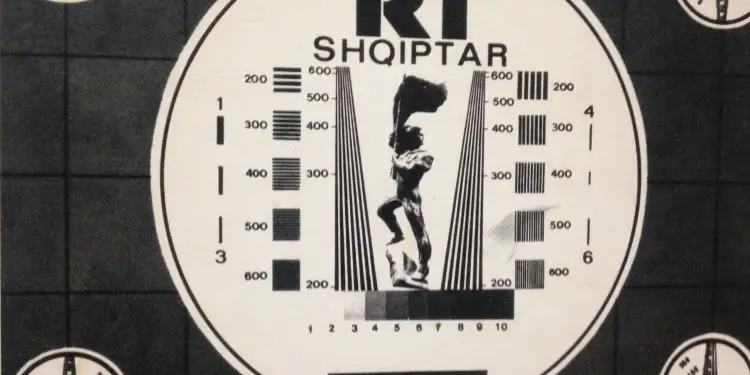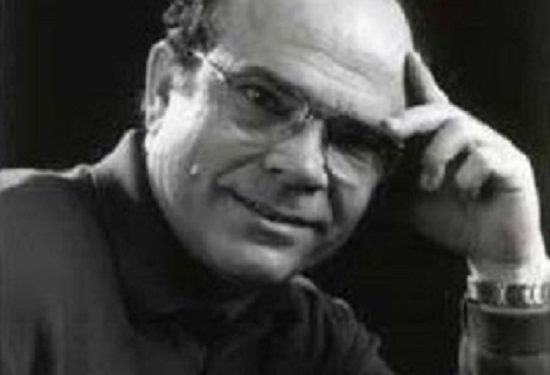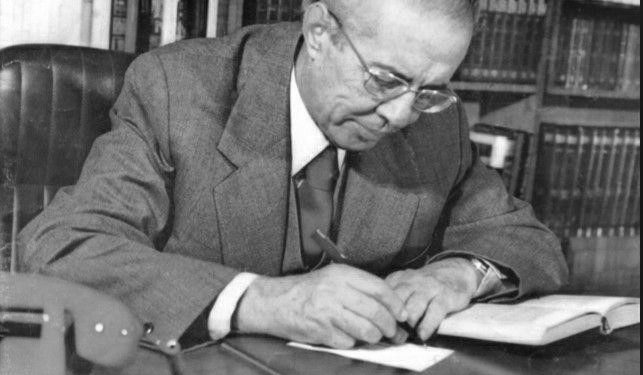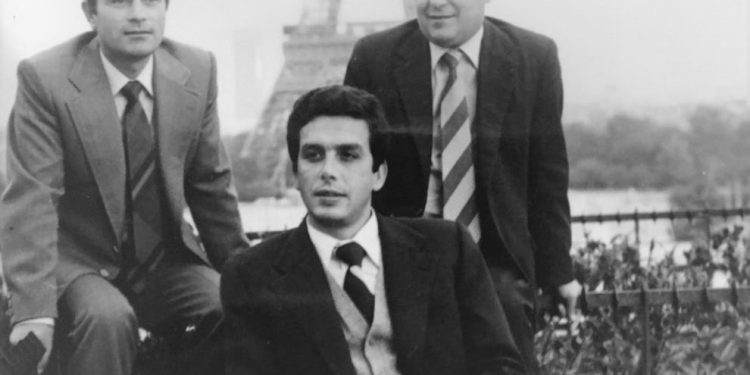By Vasil Qesari
Memorie.al/ The overthrow of the great totalitarian edifice in Albania would leave behind, not only the change of the system, accompanied by lots of hopes, mirages and cries of happiness but, unfortunately, also many wounds, dramas, victims, dust, milk and disappointments from the most different. Ten years and more after that event, which deeply shook society, completely overturning many previous codes, rules and concepts, people still continue to ask themselves such questions as: What really happened in society Albanian, during the last 50 years of the dictatorship? How was it possible that the system managed to warp everything? Why did people accept it? What was the totalitarian logic of the transformation of society and the individual? How were the structures of totalitarian mechanisms conceived and functioning: propaganda, secret police and the exercise of the ideology of terror? How did it happen that among all the communist countries of Eastern Europe, Albania was considered an exception or a special case? Why did Enver Hoxha remain blindly, fanatically loyal to Stalin until the end, turning the country into a prison where violence, fear and purges continued until the end of the 80s? Why was the country so insanely isolated, locking people up between bunkers and barbed wire? Why, then, did all the above phenomena happen…?! The book “Post-scriptum for Dictatorship” does not claim to provide definitive answers to the above questions, or the complexity of the reasons that brought and maintained the totalitarian power in Albania. Nor is it a complete, deep and comprehensive fresco of the life and suffering that people experienced during that system. Its author, perhaps, has the merit that together with the retrospective view of the totalitarian period as well as the zeal of a passionate analyst, he has tried to turn his head back once again, to give not only his personal memories and opinions, but also to return once again to the vision of that era with the simple philosophy of preserving the Memory and supporting the Appeal to never forget the well-known maxim, that…the corpse’s nails and hair continue to grow even after death! Ten years or more after the great revolution, the book in question has current value and we hope it will be appreciated by the reader because, as an Albanian researcher also says… the greatest evil that can happen to a people comes when he fails to analyze his own past. An amnesic people are forced to be constantly neuropathic and repeat their painful experiences…!
Continued from the previous issue..
1974, Autumn
In the editorial office of the local newspaper ‘Zëri i Vlorë’, a reporter who, surprisingly, was always the first to hear the most sensational news in the area and whom many called “The Kobure Journalist”, brought a very secret news. According to information from the Department of Internal Affairs, which had arrived that morning at the Party Committee, dozens of plastic cushions containing Albanian editions of the New Testament (Bible) were found on the coast of Vlora, accompanied by two or three pack of chewing gum.
– Comrade Enver did not say for nothing that foreign bourgeois ideology is always accompanied by sugary pills… – said the “Journalist with Kobure”, hurrying to go out again, of course to find out more details. The news was completely true!
Somewhere in the channel of Otranto, outside the territorial waters and in the open sea, thousands of plastic pillows with Bibles and religious pamphlets were thrown. Then the sea currents had brought them to the shores of Vlora, Zvrnec, Poros and to the Vjosa spillway. Some inhabitants of those parts, upon learning the news, had secretly searched to find the parcels that had come across the sea. Meanwhile, sailors of fishing boats returning to the pier of Skela testified that they had seen hundreds of such pillows floating on the sea. They had taken some of them and delivered them to the border command, at the port.
The authorities in the district notified Tirana with concern, while the first level alert was given in the military units. The effectives of the torpedo boats, as well as those of the warships deployed in Sazan, were notified to come out urgently and collect the entire amount of pillows with Bibles which continued sailing towards the Albanian coast. Meanwhile, numerous patrols of the border departments start work with the same objective.
The order was cut! No Holy Book was to reach the coast, and even worse, into the hands of men! A friend, an officer in the Navy, in confidence and humor told me that the sailors and soldiers of the border charged with that task, had shown themselves to be very willing and enthusiastic about collecting the pillows in question. But surprisingly, they delivered the plastic pads repeatedly torn without the gum packs inside. Poor soldiers!
It seemed that, secretly, they were taking advantage of the opportunity to try and chew for the first time in their lives the ‘American rubber’, which, perhaps, they had only seen in films or foreign television commercials…! But what was the purpose and objective of that original and rare action, for sending Bibles to Albanian shores?
After years of silence, it seemed that something was moving for the protection of the persecuted believers in Albania. In 1973, the Pope in a public prayer had called the Albanian Church, “Church of Silence” and had painfully evoked the fact that the regime of that country had destroyed all the cult objects and violently prohibited any kind of religious practice. After that message, several European dailies, including the authoritative magazines Newsweek and Time, published a series of articles on the state of religious beliefs in Albania.
In December 1973, in the book “Evangelical action for the benefit of the Silent Church”, published in France, for the first time light was shed on the tortures, punishments and exiles of Albanian bishops, priests and believers, while a month later, a Swedish daily published the article “The persecution of Christians in Albania intensifies”. In it, the chilling testimonies of a believer who managed to escape from the country were presented.
Among other things, he told about an event that happened in Durrës. There, the Security discovered a hidden underground place, where Christian believers had illegally placed icons. Under the direction of a priest, they went there to perform prayers, religious services, baptisms and even coronations of married couples.
The event, which was described as very serious and with the scandal in question, was taken directly by the State Security of the Central Committee of the Party, who, through secret circulars, once again called on all party organizations to further intensify the fight against religious beliefs. and to increase to a higher degree the revolutionary vigilance against the pressures of internal and external enemies…!
Meanwhile, abroad, actions for the protection of Albanian believers began to become even more concrete, using different ways and means. Thus, the Holy See’s communication with them was further increased through the addition of Vatican Radio broadcasts. For years and years, at 06:30 and 17:30, the team of the Albanian language section, led by Msgr. Zef Shestani, without interruption, spread news about the activity of the church in general, information about the situation in Albania, as well as announcements about the persecutions and violence of the regime.
Despite the interceptions, denunciations, arrests and imprisonments, the regime had not managed to stop her secret listening. (What role that radio has played for the future of religion, the revival of hope and the resistance to the regime in Albania, was shown from time to time, even by the few believers who managed to escape and arrive in the free world).
In addition to Radio-Vatican, during that time, through Radio-Montecarlos, Trans World Radio also started broadcasting in Albanian, while a Bible association found an original way to enable the introduction of the Bible to Albania. In the channel of Otranto, right next to Albanian territorial waters, she threw thousands of gospels packed in plastic bags into the sea, a good part of which managed to reach the southern coast of the country.
Her example, especially during the 80s, was followed by many different Protestant and evangelical organizations and associations in Europe. They ordered the printing in Albanian of more than 50,000 Bibles which were supposed to be distributed in the country through various tourist groups. (In fact, many tourists who came to Albania during those years were caught secretly distributing religious materials and were severely punished by the authorities).
In 1986, a group of Dutch tourists who came through a trip organized by Albturizm, were able to distribute to the Textile Factory in Berat, about 50 copies of the New Testament. However, they were denounced by the Security agents who were following them and, very soon, the police arrived there and surrounded the whole place, checking every inch of the compound as well as inside the tourist bus itself. There, they found over 100 Bibles, which were then publicly burned in the yard, in front of hundreds of workers.
In the years that followed, the Vatican’s concern for the vicious persecution of the Albanian church, marked continuous growth. That rare dedication and sensitivity is dedicated in a special way to John Paul II himself. Today, we can say with complete conviction that, not only no other previous Pope, but also no other personality or statesman, including those who were held as champions of anti-communism, have been so dedicated and committed to the liberation of Albania from the clutches of totalitarianism, than He.
(This was later understood by the extremely brutal attitude of the Albanian regime which, through the press and propaganda, with particular allergy and ferocity, launched fierce attacks against him. Because, for the Stalinist regime, John Paul II was The Devil himself, the fear of his word was terrible. Many examples speak clearly about this…)!
In those years, in Tirana, with the approval of the dictator himself, through an amplifier, the News Show of two Italian television channels was allowed. But, in the meantime, to prevent any transmission of the chronicles from the Holy See as well as the frequent messages of the Pope, the regime had organized a special control system. The technician in charge of Dajti’s antenna, in charge of monitoring the broadcasts, had to immediately stop the transmission of the signal, as soon as the Vatican, the figure of the Pope or any other kind of religious ceremony appeared on the screen.
…At the end of 1975 and the beginning of 1976, exactly on Christmas day, the general rehearsal of the Song Festival on Radio-Television was shot. RAI’s news edition that night began with the Pope’s greeting. Enver Hoxha, stuck to this information, waited for the picture to be interrupted. A minute passed, five, nothing…! He himself, personally, but also others after him, first called the general director, then the others in a row. When no one answered, they took all the other phones, whoever answered. But as if there was a cloud of fire, no one answered. Only late, the main leader, connected to a number in the news studio, where the broadcast of the main events of the day was being prepared.
– I am Enver Hoxha, – he had started the lecture with nerves and excitement. His mouth was speechless. – How dare you leave the Pope open? For over twenty minutes he has been talking and making propaganda to the capital about Christmas. Where are your directors? Who are you? Now, immediately, close the Dajti line…!
We reached the technical office at the time when our chief news editor K. S. was looking for paper to take notes with a receiver in hand. He was shocked by the ominous news. Fortunately, when the ultimatum ended on the phone, the Pope finished his prayer. This event did not pass without consequences. The Director General was given a serious warning. This negligence remained as a bitter memory. The technician, after examining the background of his family circle, went directly to production. After this event, the technical directorate was charged with the task of inventing some kind of remote control to close Dajti’s signal from Tirana.
In 1978, Pope John Paul II visited the Arbëresh monastery of Grottaferrata, from where, among other things, he declared: “I pray every day for Albania, which I love very much”! Two years later, he participated in the celebration of the 500th anniversary of the Martyrs of Otranto, where he said: “I turn my eyes and humble myself before the Albanian Heroic Church oppressed and deeply killed by the long and fierce persecution, but at the same time enriched by the works of its martyrs, bishops, priests and simple believers”.
Afterwards, he denounced the Albanian regime itself, adding that the martyrs of that country have often been accused of being guilty of political crimes. The Holy Father had also added that Christ himself was tortured and crucified with the same accusation. Whereas, in October 1984, during a visit to Bari, John Paul II declared full of emotion:
“My thoughts leave this city and go to my brothers and sisters in Albania, where they cannot openly and freely display their religious faith, which is a basic right for every human being… However, I I want to assure them that they are in my heart and I entrust their protection to the Holy Mary”.
After that statement, the storm of fury and attacks against him erupted again in the Albanian press and radio. The work went so far that the delegation representing Albania at the UN distributed to all the delegations of the member states a statement in which Pope John Paul II was described as a fascist and compared to Mussolini, who, right after the invasion of the country, had said the phrase known propaganda: Albania is in my heart!
After that, the answer came from the Holy See. John Paul II himself, from Saint Peter’s Cathedral, had invited the entire Catholic Church to turn November into a month of prayer for freedom of religion in Albania. Then, on April 27, 1986, he participated in a meeting of the Albanian community in Rome, where, among other things, he said:
“I pray every day for your country, for believers of all religions, and especially for the Albanian Church, which apparently no longer exists…! However, I am convinced that the Church cannot disappear from people’s hearts. Because, it is raised on the foundations of the Holy Spirit, from the Word of Christ, from Christ himself who lives alive in the heart of every believer and faithful to the religion”.
In 1988, among a group of Albanian exiles of different faiths, the Holy Father affirmed that that meeting had filled his heart full of emotions, and then he prayed:
“Virgin of Shkodra! O Lady of Albania! Cast your gaze full of grace on that nation that has received the news of the gospel from the apostles themselves that has always honored you, with special love..! Today, in the Darkness of Trial, this nation cries out in faith for your help…! Mother of Hope! Bring as soon as possible the day that this noble people will once again experience the deepest aspirations of their soul…!
During the years 1990-1991, Pope John Paul II, among other things, followed closely the events taking place in Albania. In the Easter of 1991, he addressed the Albanian believers with these words: Hold fast and walk full of hope towards the harvest season, towards harvests blessed with the fruits you deserve…!
That same day, addressing a gathering of five thousand students, he again evoked Albania, seeing in its resilience, a new example of the resurrection of Christ and his Church.
In these moments, – emphasized the Holy Father – my thoughts go once again towards heroic Albania where the Church was condemned to death, but which was resurrected among the dead.
The Pope’s trip, on April 5, 1993 in Albania, was a triumph of victory over the ordeal of those years lived full of terror and suffering. His presence and messages were followed with great enthusiasm and joy by hundreds of thousands of people of all religions. A new page full of light was opening for the history of religion and the Albanian Church…! Memorie.al
















